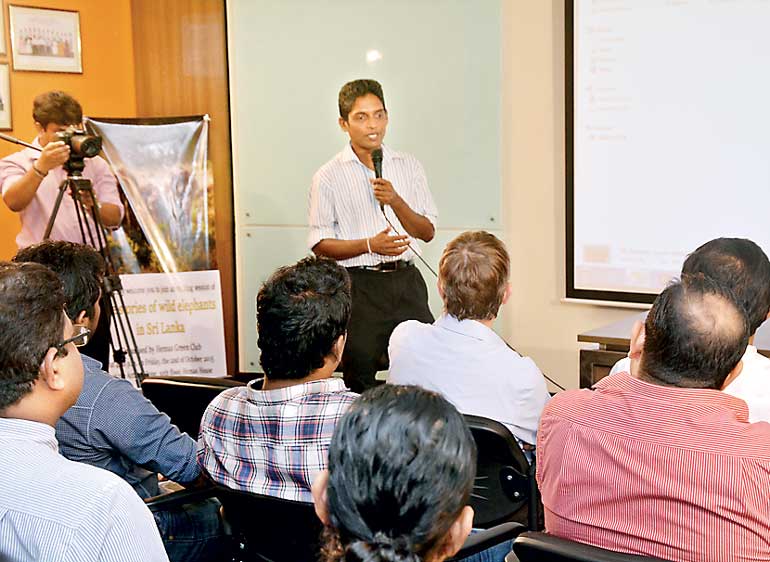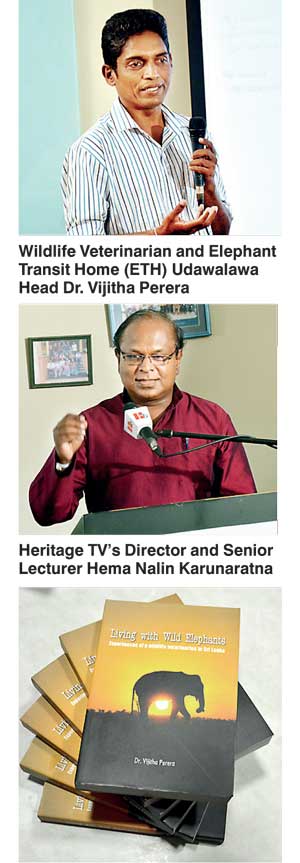Sunday Feb 22, 2026
Sunday Feb 22, 2026
Wednesday, 14 October 2015 00:00 - - {{hitsCtrl.values.hits}}

By Shannine Daniel
A celebrated Wildlife Veterinarian and Elephant Transit Home (ETH) Udawalawa Head Dr. Vijitha Perera recently launched his new book entitled ‘Living with Wild Elephants’.
The launch and the accompanying video presentation took place last week, and together with Heritage TV’s Director and Senior Lecturer Hema Nalin Karunaratna, Dr. Vijitha Perera shared his experiences dealing with these elephants living in the wild, throughout the years. He also shared the stories of several orphaned, abandoned and even injured elephant calves which had been rescued by Dr. Vijitha and his team and given sanctuary at ETH. These experiences and stories are included within the book.
Speaking about his experiences Dr. Vijitha mentioned that due to the encroaching human population and the resulting destruction of the elephants’ natural habitat the number of wild elephants is gradually lessening. “The major problem is that we have limited resources,” he stated. He mentioned further that the increase in development activities plays a colossal role in the destruction of the elephants’ habitats across the country.
Up to three elephants per week are killed in Sri Lanka as a result of clashes with humans, time and again leaving behind orphaned calves. Sri Lankan elephants are an endangered species and their survival in the natural habitat is threatened due to human activities. “The understanding is what is needed,” said Nalin Karunaratna. “And whenever we support the development, you need to think of the wild life, especially elephants if you need to see elephants in future,” he added.
Furthermore Dr. Vijitha stated that awareness was needed to be created in areas which contain a large population of elephants in light of the recent tragic events that have taken place due to the misunderstandings and conflicts between the elephants and the humans who come into contact with them.
In spite of the fact that many of these people share the same land with these wild elephants, they are somewhat unaware of the dangers that could take place by antagonising these creatures; especially young school children in rural areas are unaware of these dangers, and they need to be given this message says Dr. Vijitha. Currently there are 40 elephants living at ETH and since its opening in 1995 ETH has been a temporary home for 250 orphaned elephant until they were released back into the jungle.
The prime objective of Dr. Vijitha and his team at the Udawalawa Elephant Transit Home is to rehabilitate orphaned baby elephants so that they can be eventually released back into their natural habitat.
The elephant calves are kept at a section of the Udawalawe National Park to retain familiarity with their habitat, but have access to both food and medical care. Trained staff at the facility care for these animals, and efforts are made to restrict contact between elephants and humans to keep the elephants from becoming habituated with humans.
These elephant calves are taken care of until they are five years old, and afterwards they are released into the wild and in order to help monitor their movements, behaviour and progress they are fitted with radio collars. Before their release, careful measures are taken to erase any traces of human contact to ensure that these creatures will be accepted among their wild ‘cousins’.
Despite the hardships and risks involved and being on call for 24 hours a day, the teamwork and effort put in by Dr. Vijitha and his team into the caring and nurturing of these little elephants has ensured the success of ETH.
Referring to ‘Living with Wild elephants’, Karunaratna claimed that it is: “A beautiful book. You have the Sinhala version and now you have the English version.”
Pix by Upul Abayasekera